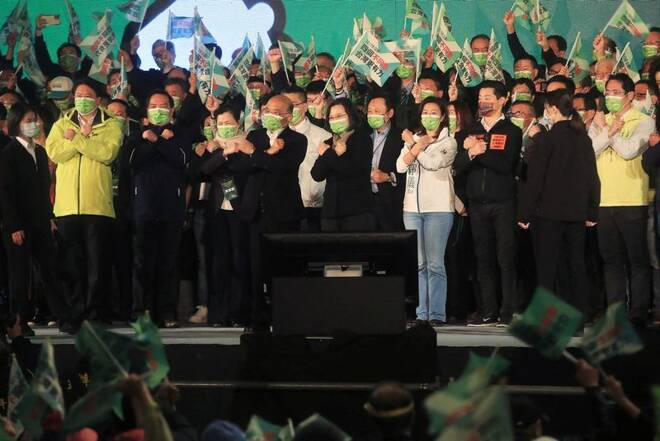Advertisement
Advertisement
Taiwan referendums fail in major setback for opposition
By:
By Ben Blanchard TAIPEI (Reuters) -Taiwan's opposition suffered a major setback on Saturday after voters rejected four referendums it had championed as a show of no confidence in the government.
By Ben Blanchard
TAIPEI (Reuters) -Taiwan’s opposition suffered a major setback on Saturday after voters rejected four referendums it had championed as a show of no confidence in the government.
The defeat of the referendums comes as Taipei faces growing military and political pressure from Beijing, and is a boost for President Tsai Ing-wen – re-elected by a landslide last year on vows to stand up to China.
China claims the democratically ruled island as its own territory.
Taiwan’s main opposition party the Kuomintang, or KMT, which traditionally favours close ties with Beijing, is hoping to make a comeback in key mayoral elections late next year.
Saturday’s two most contentious referendums asked whether to ban imports of pork containing the leanness-enhancing additive ractopamine on safety grounds, and whether to relocate a planned liquefied natural gas (LNG) terminal to protect a reef.
The government approved the pork imports last year, hoping to remove a stumbling block for a free trade deal with the United States, where ractopamine is widely used, and show it is a reliable trade partner.
It says the LNG terminal will secure energy supplies for the semiconductor-producing island, hit by power cuts in May.
Government officials have said the LNG terminal will be moved further offshore to minimise the impact on the reef, but Saturday’s referendum sought a complete relocation.
Turnout on Saturday was low, but the government welcomed the referendums’ defeat.
“Taiwan’s people want to go out into the world, and are willing to actively participate in the international community,” Tsai told reporters, referring to the pork vote.
Her government hopes the result will also bolster its case to join the Comprehensive and Progressive Agreement for Trans-Pacific Partnership, or CPTPP.
Asked about the vote, an official at the American Institute in Taiwan, the de facto U.S. embassy in the absence of formal diplomatic relations, said: “We will continue to seek constructive engagement with Taiwan on issues that affect exports of U.S. food and agricultural products.”
KMT Chairman Eric Chu, who assumed the role in September on a promise to revitalise party fortunes, apologised for the failure.
“Let’s not be discouraged. Let’s continue to work hard. We will always stand with the people. We must always represent the people’s opinions and oppose the democratic dictatorship of the government,” he said.
Cold weather could have been to blame for the low turnout, he added.
The KMT had also asked voters to approve a third issue, to restart a mothballed nuclear plant, saying that was the best way to ensure energy supplies. The government wants to phase out nuclear power.
(Reporting by Ben BlanchardEditing by William Mallard, Mark Potter and Helen Popper)
About the Author
Reuterscontributor
Reuters, the news and media division of Thomson Reuters, is the world’s largest international multimedia news provider reaching more than one billion people every day. Reuters provides trusted business, financial, national, and international news to professionals via Thomson Reuters desktops, the world's media organizations, and directly to consumers at Reuters.com and via Reuters TV. Learn more about Thomson Reuters products:
Did you find this article useful?
Latest news and analysis
Advertisement
